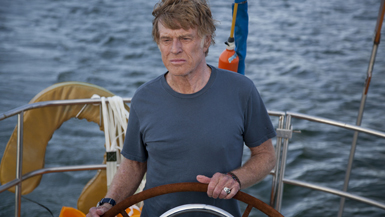Indie Watch
All is Lost
By Dan Krovich
January 30, 2014
VOD Pick of the Week
All is Lost
When the Oscar nominations were announced, it was a mild surprise that Robert Redford was not included for his performance as “Our Man” in All is Lost. Although the Best Actor category was exceedingly crowded, many felt that Redford’s reputation along with his commanding performance in a movie where he is the only actor on screen would allow him to make the final cut. The lack of a nomination does not diminish the performance and the movie.
Redford plays a man on a solo sail on his yacht in the middle of the Indian Ocean. He is awakened one morning by a sound that turns out to be a stray shipping container that has collided with his boat, leaving a gash that is letting on water. While he is able to repair the hull, his navigation and communication systems are damaged leaving him sailing blind. When storms further batter his boat, he is left stranded floating adrift in the middle of the ocean.
With all his modern sailing technology gone and supplies dwindling, he is forced to use his own resourcefulness and old fashioned sailing techniques such as navigation by the stars and nautical maps to try to formulate a plan for survival and rescue. Without voiceover and very few words spoken onscreen, Redford does an incredible job at illustrating the thought process so that even someone with no sailing experience can follow the logic of his actions.
All is Lost is the second feature film from Oscar-nominated writer/director J.C Chandor. It is quite a departure from his debut film, Margin Call, which featured an ensemble cast and lots of fast moving dialogue. Chandor takes a risk by not providing his main character much of a back story. There are no flashbacks and very few clues about the life that he has on dry land. He does not provide a simple hook to allow the audience to identify with the character and instead relies on his actions alone to draw empathy with the character and an investment in the outcome.
There seems to be a mini trend of movies about individuals who are forced to try to survive under extreme circumstances, with Gravity and Life of Pi being two recent examples. Whether this is purely coincidence or whether it is reflective of something in the zeitgeist is certainly something that can be debated. Despite the general survival aspect, the three films have different thematic approaches. Where Life of Pi had a strong spiritual bent and Gravity focused on a psychological metaphor, All is Lost takes a more rational, humanistic approach. It also differs in that it eschews visual effect spectacle in favor of more realism.
Available at Amazon
Available at iTunes
Available at Vudu
New releases for January 31st
12 O’clock Boys: The “12 O’clock Boys,” a group of dirt bikers who ride in packs through the urban streets of Baltimore, are profiled in this documentary through the eyes of Pug, a 13-year-old boy. While the police and city residents see them as nuisances at best, Pug, with a lack of male role models, idolizes the rebellious daredevils while Pug’s mother worries about the pull and influence they have on her son. In what has been referred to as “The Wire with wheelies,” 12 O’clock Boys uses the street bike culture as an entrée into a look at the challenges of growing up in an inner city.
Available at iTunes
Available at Vudu
At Middleton: In what sounds like a cross between Before Midnight and Enough Said, Andy Garcia and Vera Farmiga play two parents of college bound children who meet on a college tour with their kids. Escaping together from the tour, they spend the day together reminiscing about their old college days and what their lives have become.
Available at Vudu
Tim’s Vermeer: Directed by Teller of Penn and Teller fame, Tim’s Vermeer follows Texas inventor Tim Jenison with no real painting talent to recreate a Vermeer painting. In his years long quest, he also puts forth the theory that Vermeer used a camera obscura technique to create his paintings in such a photo realistic look more than a century before the invention of the camera. The documentary film, which was on the Oscar shortlist, touches on the link between art and technology as well as challenging art history.




